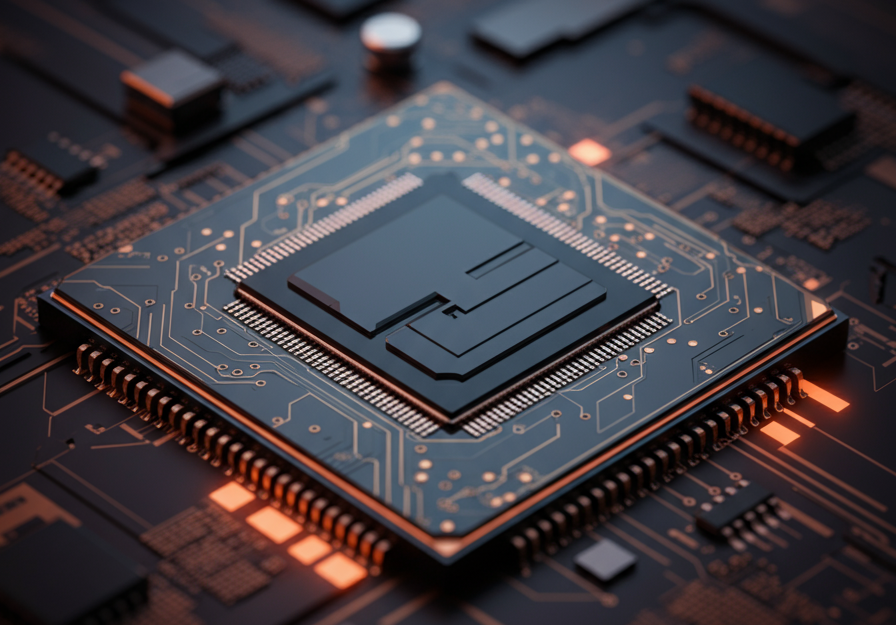The global race to dominate the AI chip market is intensifying, with several key players competing for supremacy. The increasing demand drives this fierce competition for high-performance chips that can power advanced AI applications, from deep learning to autonomous vehicles. Let’s dive into the prominent contenders in the AI chip battle and explore what sets them apart.
AI Chip Wars
Introduction to AI Chips
AI chips, also known as AI accelerators or AI processors, are specialized hardware designed to accelerate artificial intelligence tasks. Unlike general-purpose microprocessors, AI chips are optimized to handle complex computations more efficiently, making them indispensable in data-intensive applications.
The evolution of AI chips can be traced back to the mid-20th century when the first electronic computers were developed. However, the rapid advancements in AI and machine learning over the past decade have required creating more sophisticated and powerful processing units. For instance, Graphics Processing Units (GPUs) started to be repurposed for AI workloads in the early 2010s due to their parallel processing capabilities. This was a significant milestone that spearheaded the need for more specialized silicon.

Market Data and Growth
According to market research, the global AI chip market was valued at approximately $6 billion in 2020 and is projected to reach $91.18 billion by 2025, growing at a compound annual growth rate (CAGR) of 45.2%. This explosive growth is attributed to the burgeoning demand for AI across various sectors, such as healthcare, automotive, finance, and more. Furthermore, leading companies are heavily investing in research and development to gain a competitive edge, propelling the market’s advancement at a breakneck pace.
In summary, AI chips are the backbone of modern AI applications, with a rich history and a robust market outlook. As we delve deeper into the contenders in this space, it becomes evident that innovation and strategic investments are crucial to winning the AI chip wars. Let’s take a closer look at some of the major players in this race.
Prominent Players in the AI Chip Wars
Intel Corporation
Intel, one of the world’s largest semiconductor companies, is dominant in the AI chip market. The company has invested heavily in AI for years and recently acquired Israeli-based startup Habana Labs for $2 billion. Habana Labs specializes in AI accelerators and is expected to bolster Intel’s AI portfolio significantly.
Intel is making significant strides in the AI chip market. Known for its central processing units (CPUs), Intel is diversifying its portfolio to include AI-specific chips.
Technological Edge:
Intel Nervana:
One of Intel’s most notable products is the Nervana Neural Network Processor (NNP), designed specifically for deep learning workloads. This chip delivers up to 9 times more performance than previous generations, making it a top choice for data centers and cloud computing providers.
Xeon Scalable Processors:
These processors are optimized for AI workloads, providing scalable performance for data centers and cloud environments.
OpenVINO Toolkit:
Intel’s OpenVINO (Open Visual Inference and Neural Network Optimization) toolkit helps developers deploy AI models across various Intel hardware, ensuring flexibility and performance optimization.
NVIDIA Corporation
NVIDIA, another semiconductor industry giant, is renowned for its powerful GPUs used in gaming and other graphics-intensive applications. However, the company has also made a name for itself in the AI space with its line of Tensor Core GPUs.
Technological Edge:
CUDA Architecture:
NVIDIA’s CUDA (Compute Unified Device Architecture) allows developers to leverage GPUs’ parallel processing power, providing significant performance enhancements for AI workloads.
Tensor Cores:
Designed explicitly for deep learning, Tensor Cores accelerate matrix operations, which is fundamental to neural network training and inference. NVIDIA’s Tensor Core GPUs are designed to accelerate neural network operations and have become a staple in AI training and inference tasks. The company’s latest offering, the A100 GPU, boasts an impressive five petaflops of AI performance and has been adopted by major players like Google and Amazon for their cloud services.
DGX Systems:
NVIDIA’s DGX systems are pre-configured AI supercomputers that offer unmatched performance for enterprise-level AI research and development.
AMD
AMD (Advanced Micro Devices) is a prominent player in the CPU market but has also ventured into AI with its line of Radeon Instinct GPUs. These powerful GPUs are designed for high-performance computing and machine-learning applications. AMD’s recent acquisition of Xilinx, a leader in field-programmable gate arrays (FPGAs), is expected to strengthen its position in the AI chip market further.
Technological Edge:
Radeon Instinct:
AMD’s Radeon Instinct accelerators are designed for deep learning and HPC (high-performance computing) applications, offering robust performance and efficiency.
ROCm Platform:
The Radeon Open Compute (ROCm) platform is an open-source software suite that provides tools and libraries for AI and machine learning development on AMD hardware.
EPYC Processors:
AMD’s EPYC processors deliver high core counts and memory bandwidth, making them ideal for data-intensive AI workloads.
Qualcomm
Qualcomm, known for its mobile processors, has also entered the AI chip wars with its Snapdragon Neural Processing Engine (NPE). This software development kit (SDK) enables AI capabilities on Qualcomm’s Snapdragon mobile platforms, making it easier for developers to integrate AI into their applications. The company has also introduced the Cloud AI 100 Accelerator, targeting data centers and edge computing.
Google, a powerhouse in AI research and development, has ventured into the AI chip market with its custom-designed Tensor Processing Units (TPUs). These chips are tailored specifically for Google’s AI capabilities and are widely used in its data centers.
Technological Edge:
Tensor Processing Units (TPUs):
Google’s TPUs are specialized hardware accelerators that provide exceptional performance for training and inferencing large-scale machine learning models.
Edge TPU:
Designed for edge computing applications, the Edge TPU offers low-latency, efficient inference capabilities for AI models deployed on edge devices.
TensorFlow Integration:
Google’s TPUs are seamlessly integrated with TensorFlow, one of the most popular open-source AI frameworks. This allows developers to deploy models efficiently on TPU hardware.
The Future of AI Chips
As the demand for advanced AI applications continues to rise, so does the need for more powerful and efficient AI chips. The future of the AI chip market is poised for significant growth and innovation, with players constantly pushing the boundaries to stay ahead.
Some emerging technologies that may shape the future of AI chips include neuromorphic computing, which mimics the human brain’s neural networks, and quantum computing, which has the potential to solve complex problems at lightning speeds.
In conclusion, the AI chip wars are far from over, and we can expect even more intense competition as companies strive to develop cutting-edge technology that will shape our future. As a result, the advancements in AI chips will continue to drive innovation and revolutionize various industries, making them integral components of our modern world. So stay tuned for more developments in this exciting and ever-evolving field. Overall, AI chips are a crucial part of the ever-changing technology landscape, and their continued evolution will undoubtedly profoundly impact our world.
Conclusion
The global AI chip battle is a high-stakes competition with NVIDIA, Intel, AMD, and Google leading the charge. Each of these critical players brings distinct technological advancements to the table, pushing the boundaries of what is possible in AI and machine learning. As the demand for AI-powered solutions continues to grow, the innovations from these companies will play a crucial role in shaping the future of technology.
For those in artificial intelligence and software development, staying informed about developments in AI chip technology is essential. These advancements drive progress and open new possibilities for innovation and application.



